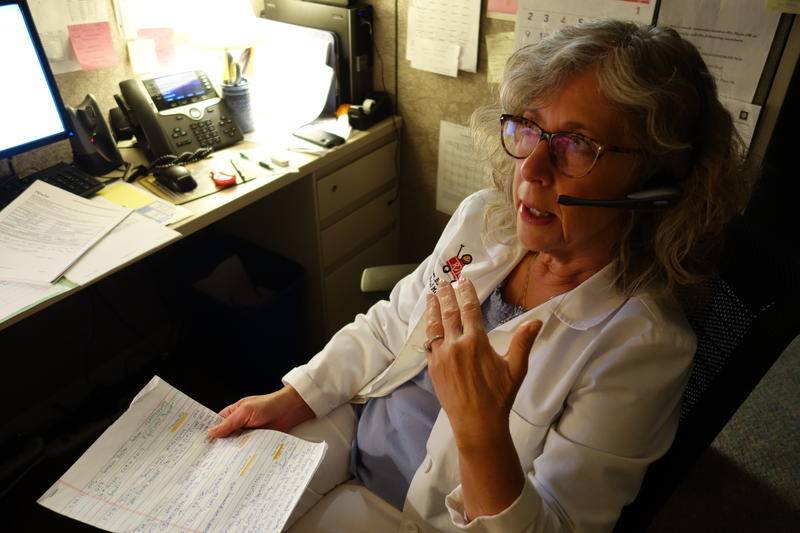
Nurse "Bizz" Grimes tries to nail out prior authorization snags for pregnant mothers. “This has become a battle, and I’m going to win." Photo: Emily Forman/Side Effects Public Media
Nurse Catherine “Bizz” Grimes moves like her name sounds: at a frenetic pace. She darts across the hall from the prenatal diagnosis clinic at Indiana University Health University Hospital in Indianapolis, sits down at her cubicle, puts on her headset over curly white blonde hair and starts dialing.
A pen in one hand, a notepad in the other, she logs every call. She calls this her log of “Medicaid messes and nightmares.” She invested 57 minutes in one patient’s case yesterday (put on hold once, forwarded three times). This is round two.
“It’s like, ‘OK, this has become a battle, and I’m going to win,’” Grimes says. “And I usually do.”
Grimes spends over 20 hours a week calling pharmacy directors and insurance plan supervisors. She’s fighting to get insurers to cover her pregnant patients’ addiction medicine—keeping them in stable treatment for the length of their pregnancy.
Insurers set rules that sometime make patients wait for days for their addiction medicine. Pregnant women need a medication called Subutex (buprenorphine) to have healthy pregnancies. Without Subutex, or a similar medication such as methadone, patients will go through withdrawal. They could possibly deliver early and lose their baby or relapse and expose the baby to infections.
And of course, if they relapse, they could overdose.
Even though most insurers cover Subutex, insurance plans require paperwork, called a prior authorization, before they’ll approve its use. Prior authorization requirements are especially onerous for pregnant women on Medicaid who may have to submit new paperwork multiple times during their pregnancy. Any one of these could become a potential crisis.
“What’s so frustrating about it is their pregnancy in theory could be held hostage by these people who are not medical professionals,” says Grimes.
Waiting for meds
The prenatal diagnosis clinic at Indiana University Health University Hospital where Grimes works specializes in working with mothers addicted to opioids. They rely on Grimes to handle insurance obstacles and keep patients in consistent treatment. Almost all of her patients are covered through Medicaid.
Prior authorizations can be riddled with bureaucratic hold-ups and clerical errors. Grimes spends a lot of time re-faxing information she’s already sent, such as patients’ drug test results or proof they’re in therapy. The hounding phone calls ensure these bureaucratic errors get fixed quickly. Without someone like Grimes to help, many women give up when they get a denial. Grimes never does.
One woman Grimes helped is Briana Roahrig. A 33-year-old mother of two girls, she’d been in and out of treatment for an addiction to opioids that started when she got hurt in a diving accident at 17.
Grimes got Roahrig’s insurance plan to approve the paperwork for her medicine. But then the plan mistakenly sent her a letter, denying coverage. Since she couldn’t afford the medication out-of-pocket, Roahrig stopped coming to the clinic and got sick from withdrawal.
Roahrig says, before Grimes, she fought her prior authorization battles alone. Sometimes approval took over a week. Sometimes she’d sweat it out, other times she’d relapse. Sometimes when she was stuck in bed from the withdrawal symptoms, she’d pull her daughters into bed with her and give them an iPad to play with.
“Then I struggle to get up to make them food,” she says.
This time, when Roahrig didn’t show up to her appointment. Grimes called. She got things worked out within hours.
“If Bizz wasn’t around, I would have been screwed. I would have been without meds still, but she called and called and called until it finally went through,” says Roahrig.
Inconsistent coverage
Often, patients have to get multiple prior authorizations throughout their pregnancy.
When a woman becomes pregnant, she’ll likely need to shift from her current medicine to Subutex. During pregnancy, the state could switch a patient to a different insurance plan for pregnant women, or a doctor could prescribe a higher dose (common during a third trimester.) After delivery, she might need to switch to another medication. All these steps can require separate prior authorizations.
“It’s just insane. I mean, it’s not like it’s some unusual drug that only a few number of people need,” says Grimes. “It’s an epidemic.”
Addiction treatment specialists say these roadblocks are a deliberate effort by the insurance industry to limit costs, though industry representatives argue they need prior authorizations to prevent people from abusing the opioid-based medication.
The U.S. passed a law in 2008 requiring insurers to treat mental and physical illnesses equally, but there are still inconsistencies in practice. Dr. Louis Baxter, past president of the American Society of Addiction Medicine, points out the strict prior authorization requirements for Subutex and other forms of buprenorphine are generally not applied to opioid painkillers.
“A doctor can write a prescription for oxycontin or morphine sulfate. The patient can take the prescription to the pharmacy and get it filled no problem,” he says. “From our standpoint that is not equitable.”
In a report published by the federal government in 2014, researchers found that prior authorizations were in use in Medicaid programs in 48 states.
It can be a matter of life and death, says Baxter. If a patient has to wait for three to five days, they may start using heroin or other opioids again. He’s even had a patient who overdosed and died while waiting.
Last year, New York outlawed prior authorizations for its Medicaid insurance plans. In New Jersey, a new law will go into effect in January to require insurers to provide at least a six-month supply of the meds while waiting for prior authorizations. But in many states, patients still face administrative barriers.
A daily battle
For Grimes, her job is a constant challenge to remove these barriers. And she never lets up. When an insurance company makes a mistake, she doesn’t like to let an hour to go by without calling them to get to the bottom of it.
Now she wants to find out why someone sent Briana Roahrig a denial letter, after the drug was supposed to be approved.
She calls up an insurance plan manager. Partly she’s trying to understand their process so she can figure out the most direct way to cut through the red tape next time. Partly she just wants to make someone pay.
The supervisor on the phone starts questioning Roahrig’s medical history. Grimes cuts her off: “Our doctors know what’s going on...”
She continues in a forceful tone: “I don’t know why our pregnant patient was forced to withdraw for three days.”
She continues to chide the insurances supervisor, reminding her she’s not the medical professional— Roahrig’s doctor is. She gets an apology.
Another battle fought and won. Tomorrow she’ll be back here, headset on, pen and notebook in hand, working one phone call at a time for her patients’ healthy pregnancies.
This story was produced by Side Effects Public Media, a reporting collaborative focused on public health.
 DONATE
DONATE






 View More Articles
View More Articles


 Support WFYI. We can't do it without you.
Support WFYI. We can't do it without you.